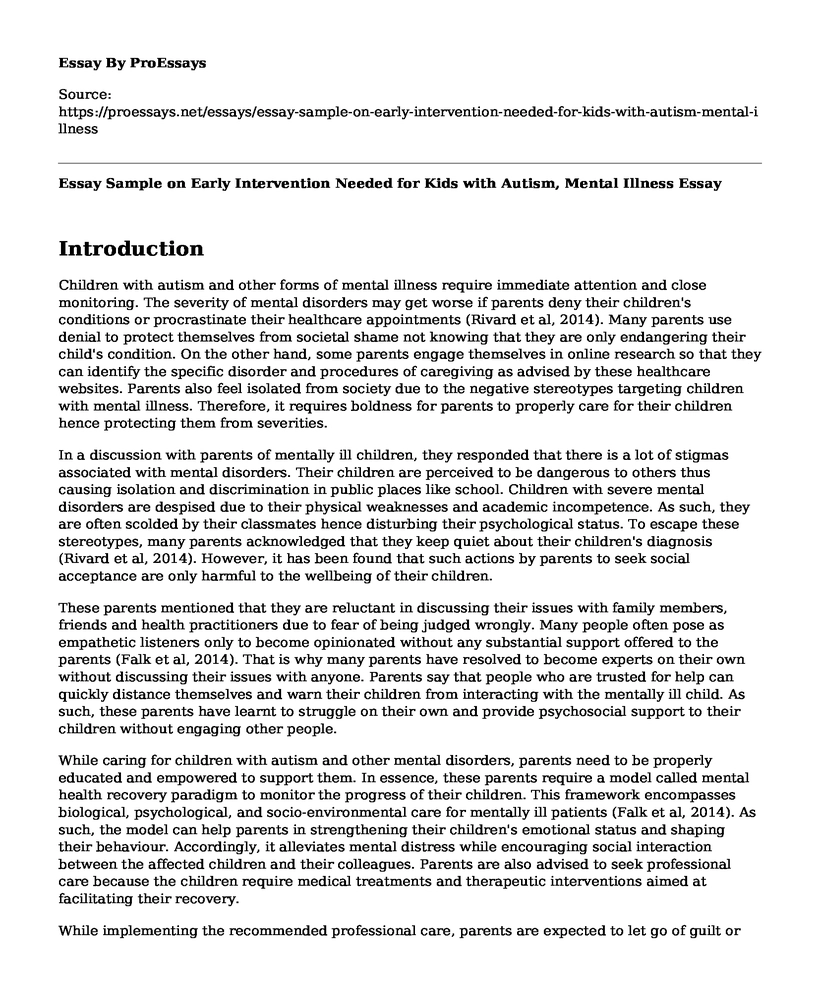Introduction
Children with autism and other forms of mental illness require immediate attention and close monitoring. The severity of mental disorders may get worse if parents deny their children's conditions or procrastinate their healthcare appointments (Rivard et al, 2014). Many parents use denial to protect themselves from societal shame not knowing that they are only endangering their child's condition. On the other hand, some parents engage themselves in online research so that they can identify the specific disorder and procedures of caregiving as advised by these healthcare websites. Parents also feel isolated from society due to the negative stereotypes targeting children with mental illness. Therefore, it requires boldness for parents to properly care for their children hence protecting them from severities.
In a discussion with parents of mentally ill children, they responded that there is a lot of stigmas associated with mental disorders. Their children are perceived to be dangerous to others thus causing isolation and discrimination in public places like school. Children with severe mental disorders are despised due to their physical weaknesses and academic incompetence. As such, they are often scolded by their classmates hence disturbing their psychological status. To escape these stereotypes, many parents acknowledged that they keep quiet about their children's diagnosis (Rivard et al, 2014). However, it has been found that such actions by parents to seek social acceptance are only harmful to the wellbeing of their children.
These parents mentioned that they are reluctant in discussing their issues with family members, friends and health practitioners due to fear of being judged wrongly. Many people often pose as empathetic listeners only to become opinionated without any substantial support offered to the parents (Falk et al, 2014). That is why many parents have resolved to become experts on their own without discussing their issues with anyone. Parents say that people who are trusted for help can quickly distance themselves and warn their children from interacting with the mentally ill child. As such, these parents have learnt to struggle on their own and provide psychosocial support to their children without engaging other people.
While caring for children with autism and other mental disorders, parents need to be properly educated and empowered to support them. In essence, these parents require a model called mental health recovery paradigm to monitor the progress of their children. This framework encompasses biological, psychological, and socio-environmental care for mentally ill patients (Falk et al, 2014). As such, the model can help parents in strengthening their children's emotional status and shaping their behaviour. Accordingly, it alleviates mental distress while encouraging social interaction between the affected children and their colleagues. Parents are also advised to seek professional care because the children require medical treatments and therapeutic interventions aimed at facilitating their recovery.
While implementing the recommended professional care, parents are expected to let go of guilt or shame which can hinder them from getting involved with their children (McStay, Trembath & Dissanayake, 2014). Parents should be honest and supportive if they want the affected children to receive adequate care. Otherwise, isolation can only cause emotional burdens and psychological consequences to the children with mental disorders. Parents can also participate in forums advocating for mental awareness so that they can interact with people who are undergoing similar predicaments. This will facilitate discussions and sharing of their experiences for the benefit of the affected children. Such participation can also enlighten parents about diagnosis and reliable sources which can be used for reference. Parents should also remain cautious when dealing with mental disorders because there are many forms of these illnesses. For instance, procedures for handling children with autism are different from those required when dealing with depression or anxiety.
References
Falk, N. H., Norris, K., & Quinn, M. G. (2014). The factors predicting stress, anxiety and depression in the parents of children with autism. Journal of autism and developmental disorders, 44(12), 3185-3203.
McStay, R. L., Trembath, D., & Dissanayake, C. (2014). Stress and family quality of life in parents of children with autism spectrum disorder: parent gender and the double ABCX model. Journal of autism and developmental disorders, 44(12), 3101-3118.
Rivard, M., Terroux, A., Parent-Boursier, C., & Mercier, C. (2014). Determinants of stress in parents of children with autism spectrum disorders. Journal of autism and developmental disorders, 44(7), 1609-1620.
Cite this page
Essay Sample on Early Intervention Needed for Kids with Autism, Mental Illness. (2023, Feb 13). Retrieved from https://proessays.net/essays/essay-sample-on-early-intervention-needed-for-kids-with-autism-mental-illness
If you are the original author of this essay and no longer wish to have it published on the ProEssays website, please click below to request its removal:
- Employee Inspiration. Interpersonal Style. The Big Five Personality Test
- Early Literacy Assessment Essay
- Features Make the Person I Am Essay
- Essay Example on Exploring the Relationship Between Euthyphro's Piety and DCT Ethics
- The Dilemma of Medication for Severely Depressed Patient: Case Study
- Post-Traumatic Stress: Psychological Therapies for Prevention and Treatment - Essay Sample
- Essay Example on Born Ready for Connection: The Still Face Experiment







